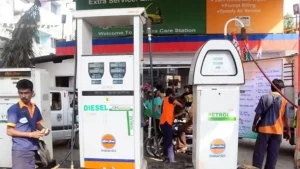This Diwali, the government gave its citizens a gift in form of lower fuel prices. As a result, this lower excise duty on fuel will cost the exchequer Rs 45,000 crore for the remaining of this fiscal as lost revenue, or 0.2 per cent of the gross domestic product (GDP).
There is a tax cut of Rs 5 per litre for petrol and Rs 10 per litre for diesel. The focal aim of the fuel price drop is to help farmers, manufacturers and transporters who have been unnerved by the steep price rises. However, this decision could cost the government Rs one lakh crore (0.45 per cent of GDP) on an annual basis in terms of lost revenues.
Furthermore, the note stated that “The tax cuts could cost the government Rs 1 trillion (0.45 per cent of GDP). This will be on an annual basis in terms of lost revenues. Additionally, around Rs 45,000 crore (0.2 per cent of GDP) for the remaining months in FY22 will be lost.”
In the first half of FY22, the consumption of petrol rose by 21.4 per cent. On the other hand, diesel consumption rose to 15.4 per cent reflecting the sharp increase in economic activity, said Nomura.
What about inflation?
A cut in excise duty on petrol and diesel will also lower fuel inflation since petrol has a 2.2 per cent weighting in the CPI basket. While diesel has a weighting of 0.15 per cent in the CPI basket.
“Assuming global crude oil prices do not increase further in November, a Rs 5/litre drop in petrol prices and Rs 10/litre cut in diesel price will be seen. It could be translated to around 0.14 percentage point (PP) reduction in headline inflation in November due to direct effects and around 0.3pp, including the second round impacts, as logistics cost decline. Consequently, we reduce our Q4-2021 CPI inflation projection marginally from 5 per cent to 4.9 per cent, although the 2021 projection remains unchanged at 5.1 per cent,” said Nomura.
It pointed out that the reduced fuel prices should be positive for consumption. The timing of the cut – on the eve of Diwali – seems designed to maximise the growth boost from festive consumption.
It has retained its GDP growth projection of 9.2 per cent for the current fiscal because of downside risks from supply-side bottlenecks on account of chip and energy shortages.

States follow the fuel-price-drop suit
Several states have announced additional reductions in fuel prices. The union government also urged states to commensurately reduce VAT on petrol and diesel to give relief to consumers.
The reduction was larger in states like Assam, Tripura, Manipur, Karnataka, Goa, Uttar Pradesh, Gujarat, Himachal Pradesh, Haryana, Uttarakhand, Bihar, Odisha and Arunachal Pradesh since they have a larger VAT.
Will the fuel price rise in future?
According to energy expert Narendra Taneja, fuel prices will rise in the coming months because India imports 86% of its oil requirements, and globally the price of crude could soon cross $100/barrel.
Today, we have to import 86 per cent of our total oil use. The prices of oils are not in the hands of any government. Both petrol and diesel are de control commodities. In July 2010, Manmohan Singh’s government implemented the deregulation on petrol. In 2014, the Modi government decontrolled diesel. Whenever there is an imbalance in demand and supply, prices are bound to increase.
The second reason is the lack of investment in the oil sector as governments are promoting renewable/green energy sectors like solar power. Therefore, crude oil will be more expensive in the coming months.
